Related Research Articles

Fellowship of the Royal Society is an award granted by the Fellows of the Royal Society of London to individuals who have made a "substantial contribution to the improvement of natural knowledge, including mathematics, engineering science, and medical science".
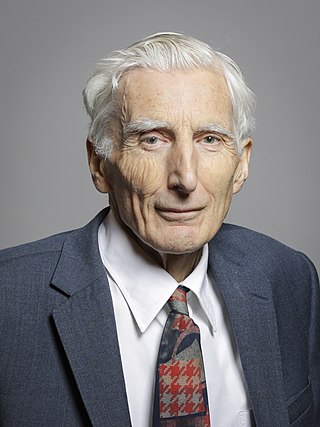
Martin John Rees, Baron Rees of Ludlow, is a British cosmologist and astrophysicist. He is the fifteenth Astronomer Royal, appointed in 1995, and was Master of Trinity College, Cambridge, from 2004 to 2012 and President of the Royal Society between 2005 and 2010.

Jack Joseph Dongarra is an American computer scientist and mathematician. He is a University Distinguished Professor of Computer Science in the Electrical Engineering and Computer Science Department at the University of Tennessee. He holds the position of a Distinguished Research Staff member in the Computer Science and Mathematics Division at Oak Ridge National Laboratory, Turing Fellowship in the School of Mathematics at the University of Manchester, and is an adjunct professor and teacher in the Computer Science Department at Rice University. He served as a faculty fellow at the Texas A&M University Institute for Advanced Study (2014–2018). Dongarra is the founding director of the Innovative Computing Laboratory at the University of Tennessee. He was the recipient of the Turing Award in 2021.
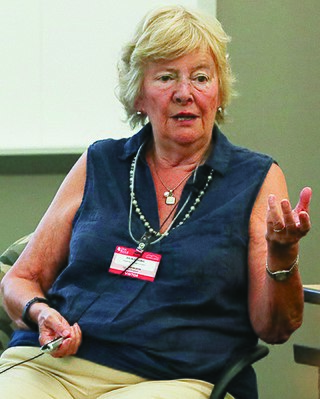
Dame Julia Stretton Higgins is a British polymer scientist. Since 1976 she has been based at the Department of Chemical Engineering at Imperial College London, where she is emeritus professor and senior research investigator.
Sarah C. Darby is Professor of Medical Statistics at the University of Oxford. Her research has focused the beneficial effects of smoking cessation, the risk of lung cancer from residential radon, and treatments for early breast cancer. She is also a Principal Scientist with the Cancer Research UK in the Clinical Trial Service Unit (CTSU) and Epidemiological Studies Unit at the Nuffield Department of Clinical Medicine, at the Radcliffe Infirmary, Oxford.
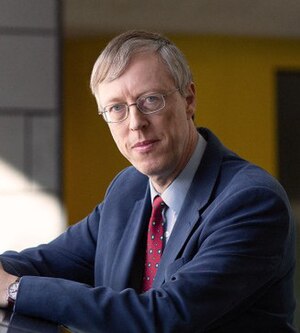
Nicholas John Higham FRS was a British numerical analyst. He was Royal Society Research Professor and Richardson Professor of Applied Mathematics in the Department of Mathematics at the University of Manchester.
Sir John James Skehel, is a British virologist and Emeritus scientist at the Francis Crick Institute in London. From 1987 to 2006 he was director of the National Institute of Medical Research (NIMR) at Mill Hill which was incorporated into the Crick Institute in 2016.

Michele Karen Dougherty is a Professor of Space Physics at Imperial College London. She is leading unmanned exploratory missions to Saturn and Jupiter and is Principal Investigator for J-MAG – a magnetometer for the European Space Agency's Jupiter Icy Moons Explorer, launched in April 2023.
The Harrison-Meldola Memorial Prizes are annual prizes awarded by Royal Society of Chemistry to chemists in Britain who are 34 years of age or below. The prize is given to scientist who demonstrate the most meritorious and promising original investigations in chemistry and published results of those investigations. There are 3 prizes given every year, each winning £5000 and a medal. Candidates are not permitted to nominate themselves.
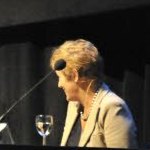
Denise Anne Lievesley is a British social statistician. She has formerly been Chief Executive of the English Information Centre for Health and Social Care, Director of Statistics at UNESCO, in which capacity she founded the UNESCO Institute for Statistics, and Director (1991–1997) of what is now the UK Data Archive.

Dame Molly Morag Stevens, is Professor of Biomedical Materials and regenerative medicine and Research Director for Biomedical Materials Sciences in the Institute of Biomedical Engineering at Imperial College London.
Gagandeep Kang FRS is an Indian microbiologist and virologist who has been leading the work on enteric diseases, diarrheal infections and disease surveillance at the Bill & Melinda Gates Foundation since 2023.
The Royal Society University Research Fellowship (URF) is a research fellowship awarded to outstanding early career scientists in the United Kingdom who are judged by the Royal Society to have the potential to become leaders in their field. The research fellowship funds all areas of research in natural science including life sciences, physical sciences and engineering, but excluding clinical medicine.

Christopher Aiden-Lee Jackson is a British geoscientist, science communicator and Director of Sustainable Geoscience at Jacobs Engineering Group. He was previously Professor of Sustainable Geoscience at the University of Manchester, and before that held the Equinor Chair of Basin Analysis at Imperial College, London. He is known for his work in geoscience, especially in the use of 3D seismic data to understand dynamic processes in sedimentary basins.
Lucy Jane Carpenter is professor of physical chemistry at the University of York and director of the Cape Verde Atmospheric Observatory (CVAO).

(Robert) Charles Swanton is British physician scientist specialising in oncology and cancer research. Swanton is a senior group leader at London's Francis Crick Institute, Royal Society Napier Professor in Cancer and thoracic medical oncologist at University College London and University College London Hospitals, co-director of the Cancer Research UK (CRUK) Lung Cancer Centre of Excellence, and Chief Clinician of Cancer Research UK.
Allan Matthews (1952) is professor of surface engineering and tribology at the University of Manchester and director of the Digitalised Surfaces Manufacturing Network.
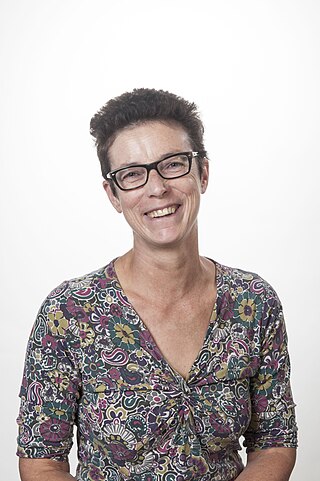
Anne Elisabeth Osbourn is a professor of biology and group leader at the John Innes Centre, where she investigates plant natural product biosynthesis. She discovered that in the plant genome, the genes involved with biosynthesis organise in clusters. She is also a popular science communicator, poet and is the founder of the Science, Art and Writing (SAW) Initiative. She was elected a member of the National Academy of Sciences in 2022.
Caetano Maria Pacheco Pais dos Reis e Sousa is a senior group leader at the Francis Crick Institute and a professor of Immunology at Imperial College London.
Azra Catherine Hilary Ghani is a British epidemiologist who is a professor of Infectious Disease Epidemiology at Imperial College London. Her research considers the mathematical modelling of infectious diseases, including malaria, bovine spongiform encephalopathy and coronavirus. She has worked with the World Health Organization on their technical strategy for malaria. She is associate director of the MRC Centre for Global Infectious Disease Analysis.
References
- ↑ "Distinguished scientists elected as Fellows and Foreign Members of the Royal Society - Royal Society". royalsociety.org.
- ↑ "Imperial scientist elected Royal Society Fellow - Imperial News - Imperial College London". Imperial News.
- ↑ "Three U of T researchers named fellows of U.K.'s Royal Society". University of Toronto News.
- ↑ "Crick scientists elected to the Royal Society". Crick.
- ↑ "Professor Lucy Carpenter elected a Fellow of the Royal Society". University of York.
- ↑ College, Green Templeton (17 April 2019). "Professor Sarah Darby named Fellow of the Royal Society". Green Templeton College.
- ↑ "Oxford academics honoured by the Royal Society — Mathematical Physical and Life Sciences Division". www.mpls.ox.ac.uk.
- ↑ www-core (webteam). "Head of Human Genetics elected Fellow of the Royal Society". www.sanger.ac.uk.
- ↑ "Gagandeep Kang becomes first Indian woman to be elected Royal Society Fellow". 19 April 2019 – via www.thehindu.com.
- ↑ "RSB Fellows elected as Fellows of the Royal Society". RSB.
- ↑ "Professor Anne Osbourn elected as Fellow of the Royal Society". John Innes Centre. 17 April 2019.
- ↑ "World-leading academics receive highest honour". Press Office.
- ↑ "News and events – Jack Dongarra elected as Foreign Member of the Royal Society - The University of Manchester - School of Mathematics". www.maths.manchester.ac.uk.